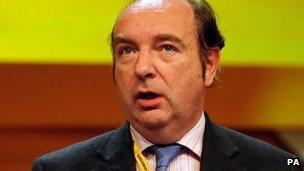Norman Baker: EU would slow down 'legal highs' fight
- Published

Norman Baker has been a Home Office minister for just over a week
Home Office minister Norman Baker has said the European Union's plan to get involved with the banning of so-called "legal highs" would not be "helpful".
The Liberal Democrat told a parliamentary committee the UK was already in a "stronger position" than most states, as it had flexibility to act act quickly.
The coalition has banned more than 200 substances since coming to power.
New arrivals still pose "quite a challenge", Mr Baker said.
Legal highs - officially known as psychoactive substances - are synthetic drugs which can be bought online and sometimes in shops. They are often created in laboratories in the Far East and are are rushed to European and other markets before authorities have time to ban them.
'Diversity'
Several deaths have been linked to legal highs in recent months. In June, two of them, known as NBOMe and Benzo Fury, were made illegal in the UK.
Mr Baker, MP for Lewes, became a Home Office minister in David Cameron's government reshuffle last week and his responsibilities include crime prevention and drugs policy.
He was questioned by the House of Lords EU Sub-Committee, which is looking at whether Brussels should have powers to impose bans on "legal highs".
It has until mid-November to make suggestions to the EU as to whether this exceeds its responsibilities.
Mr Baker, who is among the most pro-European MPs in the Commons, said the substances "should be dealt with by the member states, by and large".
'More dangerous'
He said: "It's clear that the number and diversity of of these psychoactive substances has changed in recent years.
"It's quite a challenge to respond to what are often dangerous substances. They have the unhelpful terminology of 'legal highs'... implying to the public that they are safe, as they are legal.
"In some cases the so-called legal highs are more dangerous than controlled drugs under the Misuse of Drugs Act 1971."
The minister doubted whether ceding further powers to the EU would be helpful, adding: "Here in the UK we are in a better situation than many other countries."
Parliament had "early warning legislation" in place, which meant there were generic definitions of banned substances so that "entire families of drugs" could be made illegal, he said.
This ensured that "some substances can be created that are already counted under the definition", putting the UK "ahead of the curve".
Mr Baker said that because of the UK's laws, about 80% of legal highs entering the country were "already illegal", adding that it was imperative to make the time taken to ban legal highs "as short as possible."
He said: "The new proposals open up the potential for some disputes between the EU and member states, which is not helpful.
"There's an issue as to whether or not the EU-wide decision-making promising to supplant the national arrangements is a sensible idea, if it takes away member states' jurisdiction. I say that as a Liberal Democrat."
- Published4 June 2013
- Published26 June 2013
- Published8 October 2013
- Published18 March 2013